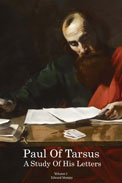
 |
Much of what most Christians accept as biblical truth centers on Paul of Tarsus's writings, but author Monjay asserts that Paul's teachings were actually in opposition to Yahshua's teachings (Jesus) and the precepts laid down by Yahweh (God). Paul was unlikely to have been a Hebrew, as he stated, nor was he truly an "apostle" since he was never with Yahshua in person. There are many contradictions in Paul's writings: he said Yahshua was angelic, contrary to the important fact that the messiah appeared in human form; he preached against circumcision, yet had Timothy circumcised because he feared the consequences, "playing both sides of the fence." He told people that the exact day of the Sabbath (Saturday) was insignificant, and he said the law was fulfilled only by loving one's neighbor, leaving Yahweh and Yahshua "out of the picture." In short, Monjay asserts, Paul used words with great skill, but he neither advocated nor followed the righteous way.
Monjay has written on a similar subject matter previously and plans a second volume regarding the inaccuracies perpetrated by Paul that seeped into the church's foundations to become false doctrine. This book shows his serious dedication to his thesis, with numerous biblical quotations from two major sources—the Hebrew Roots and Darby versions of scripture. He also includes three appendices, the last one being a lengthy list of "All of The Sins In The Scriptures" with specific biblical references. His purpose, stated in varying ways throughout the text, is to alert sincere but possibly misguided Christians to the distortions of Yahweh's truth and Yahshua's teachings lurking within what is generally considered reliable scripture. Though not all readers will be convinced, Monjay's well-researched approach underpins his assertions and could serve as a resource for Bible studies and debates.